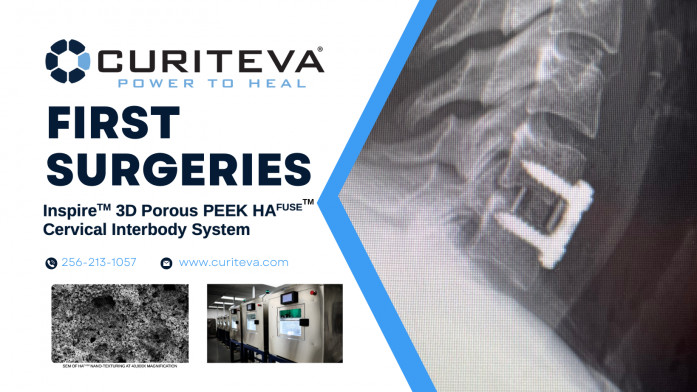

In addition to its implant grade filament, Evonik says it is also offering a testing-grade version which offers the exact same product properties but without the documentation needed for approval in medical applications. VESTAKEEP® i4 3DF by Evonik is an unfilled, high viscosity, biocompatible polyether ether ketone (PEEK) grade. Therefore, we will successively expand our product portfolio of 3D printable biomaterials.”

“Innovative high-performance materials like Evonik’s VESTAKEEP PEEK-along with highly complex hardware and software, and the perfect match between materials and machines-form the basis for a sustainable 3D-printing revolution in medical technology. Orthopaedics and maxillofacial surgery are examples of areas where this could be applied,” explained Marc Knebel, who leads the Medical Devices & Systems market segment at Evonik. “For modern medical technology, the development of our first 3D-printable implant material opens up new opportunities for customising patient treatments. Designed for standard, PEEK-compatible extrusion-based 3D printers, the natural-coloured material is produced under strict cleanroom conditions and benefits from biocompatibility, bio-stability, x-ray transparency and easy handling. Specialty chemicals company Evonik has officially launched its PEEK 3D printing filament for custom medical implants.įirst announced in 2018, VESTAKEEP i4 3DF is an ASTM F2026 compliant material which meets the specifications for PEEK polymers intended for surgical implant applications. Its other 3D printing materials are used in highly demanding environments, and include resins suitable for photocuring and powders designed for sintering-based manufacturing processes.Evonik launches implant-grade PEEK filament for medical applications. In addition to implant-grade filaments, Evonik produces a testing-grade PEEK filament that offers the same properties without the documentation needed for surgical implants. It is the world’s first 3D-printable filament to meet this requirement for medical use, according to the Essen, Germany–based specialty chemicals company. VestaKeep i4 3DF comes in filament form and meets the stringent requirements of ASTM F2026, which is the standard for PEEK polymers approved for use in surgical implant applications, said Evonik. The material is a testing grade designed for research, development and process optimization only. He cited its “fully interconnected porosity, modulus of elasticity equivalent to cancellous bone, strong biomechanical properties, radiolucency, and a bioactive surface for osseointegration.” VESTAKEEP® i4 3DF-T is a filament extruded from natural colored, high viscosity VESTAKEEP® i4 G polyether ether ketone (PEEK) resin. The Inspire porous PEEK technology checks all of the boxes for an ideal interbody implant, added Kevin Foley, MD, chairman of Semmes-Murphey Neurologic and Spine Institute and professor of neurosurgery, orthopedic surgery, and biomedical engineering at the University of Tennessee Health Science Center.

That platform is manufactured using VestaKeep i4 3DF PEEK filament on a proprietary printer designed, programmed, and built by Curiteva.Īccording to Alex Vaccaro, MD, PhD, president of Philadelphia-based Rothman Orthopedic Institute, the lattice PEEK architecture enabled by Curiteva’s 3D-printing process “represents an exciting advancement in spine, orthopedics, and neurosurgical procedures which involve any type of biologic implant."

The implant used in the surgery came from the company’s Inspire line of devices. Privately held Curiteva was founded in 2017 in Huntsville, AL, by a machinist entrepreneur dedicated to developing a portfolio of spinal implants and, notably, 3D-printed porous PEEK implants. The 3D-printed implant received 510(k) clearance from FDA in February 2023, the first such device cleared by the agency for commercial use. It’s the first time a 3D-printed interconnected porous PEEK structure made with VestaKeep i4 3DF filament has been implanted in the United States, according to Evonik. A 3D-printed device developed by Curiteva incorporating PEEK filament from Evonik was surgically implanted last week in Allentown, PA.


 0 kommentar(er)
0 kommentar(er)
